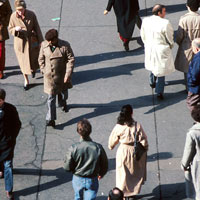- About Us
- Columns
- Letters
- Cartoons
- The Udder Limits
- Archives
- Ezy Reading Archive
- 2024 Cud Archives
- 2023 Cud Archives
- 2022 Cud Archives
- 2021 Cud Archives
- 2020 Cud Archives
- 2015-2019
- 2010-2014
- 2004-2009
 |
...But Don't Your Care About...? |
I never started counting the number of times that I have been accosted in public by charity vendors who "just want a minute" of my time, but today I definitely stopped.
Soliciting donations for charities in public places is nothing new, but if the practice continues in its current form it will not continue to serve the best interests of the community for much longer.
Spruiking for donations is a slightly more respectable form of begging. Rather than being approached by the wretched and diseased person who could be saved with the jingle of a gold coin we are interrupted by the cheery face and bright T-Shirt of the Charity Spruiker. These types loiter aside footpaths, usually perched on the shoulder of the main thoroughfares ready to peddle their magic trinkets to purge the guilt of almost any passer-by.
 The experienced spruikers pick their quarry well. Those of us accustomed to their ways become bullish as we quicken our step and feign distraction. The spruiker as Matador. The Bull accepts a line of passage from a distance, his glazed eyes locked on a far street-corner. Pacing into deeper into the arena the Matador crabs closer to the line of approach with casual, but cautious eyes. The best amongst them will let many lesser targets trickle by unchallenged when they spot a prize animal down the street. Nearing the final moments of the pass, both parties sneak a quick glance shoeward. This brief diversion of eyes offers the relief only known by those who often stare at fires. It does not distract either party from the task at hand, but fortifies the resolve. Both are committed to a destiny that cannot be betrayed by a relieving glance. Momentum is now with the feet and the body and the heart. At the approach of a determined bull, the wise Matador withdraws his challenge with a dismissive wave of the clipboard. Occasionally a parting shot of "Don't you care about the..." trails off into the crowd.
The experienced spruikers pick their quarry well. Those of us accustomed to their ways become bullish as we quicken our step and feign distraction. The spruiker as Matador. The Bull accepts a line of passage from a distance, his glazed eyes locked on a far street-corner. Pacing into deeper into the arena the Matador crabs closer to the line of approach with casual, but cautious eyes. The best amongst them will let many lesser targets trickle by unchallenged when they spot a prize animal down the street. Nearing the final moments of the pass, both parties sneak a quick glance shoeward. This brief diversion of eyes offers the relief only known by those who often stare at fires. It does not distract either party from the task at hand, but fortifies the resolve. Both are committed to a destiny that cannot be betrayed by a relieving glance. Momentum is now with the feet and the body and the heart. At the approach of a determined bull, the wise Matador withdraws his challenge with a dismissive wave of the clipboard. Occasionally a parting shot of "Don't you care about the..." trails off into the crowd.
I understand the benefits of such practices. Without the help of these sometime volunteers (some organizations actually pay their employees) general awareness of charities would be lower. However this can easily lead to the overestimation of a shrewdly marketed charity at the expense of other charities that may have a greater relevance to more people, and have a greater need for financial support.
Is it best for us to donate to an environmental cause? Should we be spending on Medical research of some type? Should we give to a church, homeless shelter, animal home or other organisation? Should we be donating domestically? Should we be donating abroad? Where does our money actually go? Who oversees its distribution? Is it spent efficiently?
There are a number of considerations we should make before deciding to donate to any charity. The problem is that the most appealing and well-marketed charities are getting the lion's share of our benevolence at the expense of lesser'known causes. Anything that involves children or animals seems to do well. They are cute and cuddly with so much to live for, and accordingly are very marketable.
Recently, I noticed that a very prominent charity had its logo branded all over a brand new Volkswagen Beetle. The current retail price of the Beetle is around $30,000. Wouldn't that money be more useful spent elsewhere, perhaps on needs of the children this charity is supposed to be helping? It is probable that this car was donated by the dealership or there was a significant discount involved, but wouldn't a donation be better off in some other more practical form? Wouldn't the dealership be better off donating a car for a raffle or auction? The unfortunate answer is no. The best way for this charity to increase donations is by driving around in a cute car that projects their brand image. This charity will probably raise more donations because of this marketing strategy than they ever could have by raffling the car. (As an aside, consider how much free brand equity Volkswagen is building through this exercise. I would suggest that it would outweigh the costs of a fleet of cars.)
I do not blame the charities for these tactics; they are just playing the game to stay afloat. The problem with tactics like these is that all charities will end up spending more and more money on marketing themselves. This will be either through direct financial expense, or by wasting more valuable time and efforts of their voluntary and paid personnel.
The ability for charities to cut through and strike a chord with the public is diminishing fast. It seems like every day has been claimed by one cause or another. Today it is National This Day; tomorrow it is National That day, the day after it's some other National Day for purging one's guilt. "Another Day, Another Dollar, Another Ribbon" might soon be uttered in elevators. But unless the total amount that Australians donate to charities increases at the same rate as Charity marketing costs, then the future will be bleak.
 One thing that is as important than financial contributions is the captive attention of the public. There is so little space and forum for discussion of charitable causes. I presented to you a little bullfight above to demonstrate my point. I'm never sure exactly which charity I am giving to if I toss a few coins into a Spruiker's white plastic bucket at the train station. They all look so alike. If I were to offer all the "minutes" and "seconds" of time requested of me on my walk from the station to my office, I would still be standing there listening to the terrible plight of one poor group or another. Not long ago I started receiving regular cold calls at home from Charity Spruikers. What is going on? The "Marketing Survey" call is one of the more invasive and annoying practices that we must endure in contemporary life, surely this is well beneath charity? It will not be too long before I view all charitable organizations with complete contempt. Rogue operators like these are "devaluing the charitable brand" so to speak. I am sure that I am not alone.
One thing that is as important than financial contributions is the captive attention of the public. There is so little space and forum for discussion of charitable causes. I presented to you a little bullfight above to demonstrate my point. I'm never sure exactly which charity I am giving to if I toss a few coins into a Spruiker's white plastic bucket at the train station. They all look so alike. If I were to offer all the "minutes" and "seconds" of time requested of me on my walk from the station to my office, I would still be standing there listening to the terrible plight of one poor group or another. Not long ago I started receiving regular cold calls at home from Charity Spruikers. What is going on? The "Marketing Survey" call is one of the more invasive and annoying practices that we must endure in contemporary life, surely this is well beneath charity? It will not be too long before I view all charitable organizations with complete contempt. Rogue operators like these are "devaluing the charitable brand" so to speak. I am sure that I am not alone.
If we must endure the Spruikers and unsolicited calls, wouldn't it be much wiser for charities to band together? Rather than have umpteen "Every-Colour-of-the-Rainbow Days", perhaps we could have three or four annual events. The concentrated efforts of many charities and natural efficiency from sharing the cost of promoting such an exercise would undoubtedly create a larger response, and serve to maintain public trust. At the same time, money could be donated equally to a number of charities for donations collected at the same time. Wouldn't it be nice to know that your donation would be going to help several different groups, rather than just one? In the meantime, I encourage you to donate anonymously to a charity that you feel will spend your donation in a way that would make you feel good.
images courtesy of Geek Philosopher
